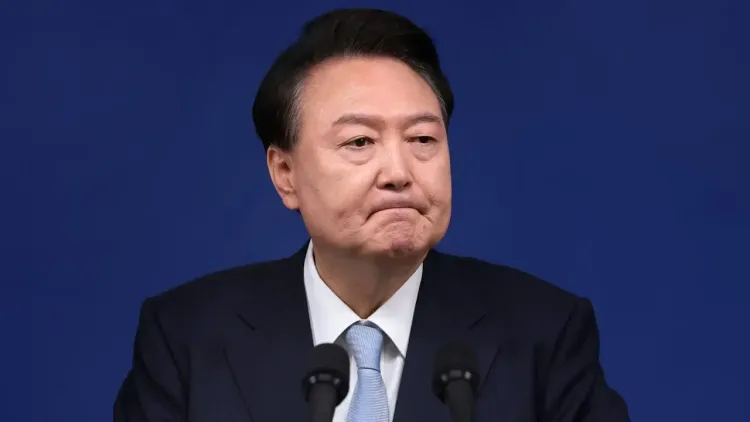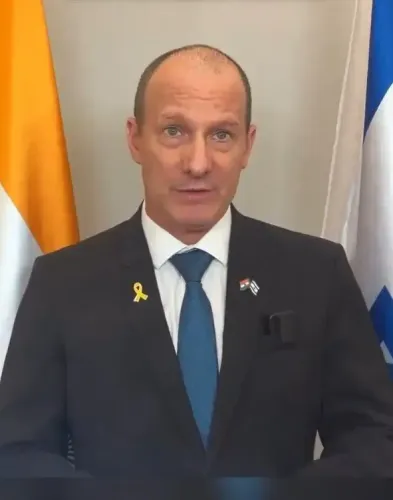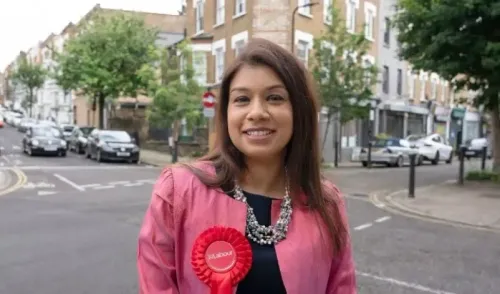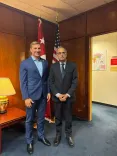South Korea: Authorities Arrest Impeached President Yoon Over Martial Law

Synopsis
Key Takeaways
- Yoon Suk Yeol arrested for martial law declaration.
- First sitting president in South Korea to be detained.
- Warrant executed at 10:33 a.m. by the CIO.
- Yoon faces charges of insurrection and abuse of power.
- Police deployed 3,000 personnel to secure the area.
Seoul, Jan 15 (NationPress) Authorities have arrested impeached President Yoon Suk Yeol at his residence on Wednesday, marking their second effort to take him into custody for questioning about his brief declaration of martial law.
A warrant for Yoon's detention was executed at 10:33 a.m., as reported by the Corruption Investigation Office for High-ranking Officials (CIO), making it a historic moment as he becomes the first sitting president to be arrested, according to Yonhap news agency.
A convoy transporting Yoon departed from the presidential residence in central Seoul shortly after the warrant execution, heading towards the CIO office located in Gwacheon, just south of the capital.
Upon arrival, Yoon was seen exiting a vehicle and entering the office for questioning, with investigators expected to seek a formal arrest warrant within 48 hours.
Following his impeachment by the National Assembly on December 14, Yoon, who is currently suspended from his duties, faces allegations of insurrection and abuse of power.
He is accused of deploying troops to the National Assembly after declaring martial law on the evening of December 3 to prevent lawmakers from rejecting the decree.
Post-questioning, Yoon is expected to be held at the Seoul Detention Center in Uiwang, situated near the CIO's office.
The impeached president has defended his martial law declaration as an “act of governance”, intended to caution the main opposition Democratic Party against what he termed their misuse of legislative power.
In a video message released after his arrest, Yoon remained resolute, stating, “Although it is an illegal investigation, I decided to agree to appear at the CIO in order to prevent ugly bloodshed.”
The arrest came after prolonged discussions between investigators and Yoon’s team at his residence regarding the appropriate method for his detention.
“At this point, we are not considering his voluntary appearance and our aim is to execute the warrant,” an official from the CIO informed reporters earlier.
“Unlike during the first attempt, there were no personnel or Presidential Security Service (PSS) staff actively resisting the execution,” the official added. “There were practically no physical clashes today.”
Investigators were forced to use ladders to access the presidential residence after being obstructed by the PSS, which had set up a barricade with vehicles at the entrance. They also faced resistance from a group of lawmakers from the ruling People Power Party and Yoon’s legal team at the entrance.
Some investigators appeared to attempt to gain access through a nearby hiking trail.
“This is not a just enforcement of the law,” stated Yun Gap-geun, one of the attorneys, labeling the investigators' approach as “illegal.”
Authorities deployed approximately 3,000 police personnel to ensure access to the compound, resulting in physical confrontations between investigators and Yoon's supporters. Emergency services were called to assist a middle-aged woman who fell during the chaos.
Earlier in the month, investigators failed to detain Yoon after an extended standoff with his security staff at the residence.
The Seoul Western District Court issued warrants to search the presidential residence and detain Yoon after he ignored three summonses from investigators for questioning.
These warrants, which were extended last week after expiring, will remain valid until January 21.









